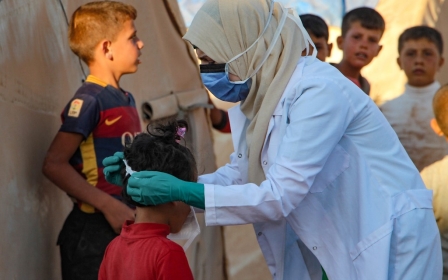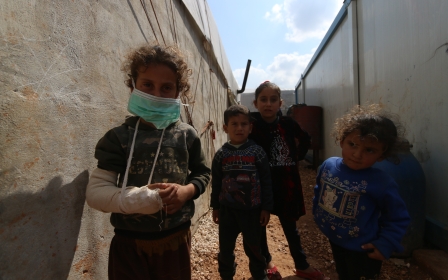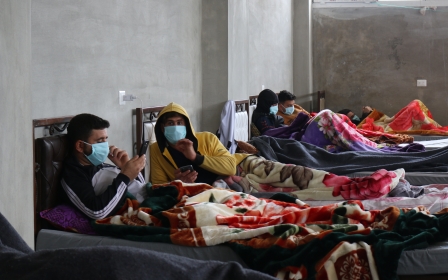Syria's displaced in Idlib tackle coronavirus despite lack of support
View of a sprawling tent camp in al-Karama near the Syrian-Turkish border. It’s one of several camps for the displaced in Syria's northwestern Idlib province.
Syrians living in densely populated displacement camps say they are worried about the spread of coronavirus but find it difficult to adopt preventative measures, such as social distancing or washing hands frequently with soap and water.
“It’s a disaster,” Ibrahim Darwish, originally from the southern countryside of Idlib, told Middle East Eye.
“I live in a small three-by-three-meter tent with my pregnant wife and two children. We do our best to follow the necessary precautions such as wearing a mask when going out, but we end up isolating ourselves inside our tent most of the time for fear of contracting the virus, especially when all the tents are located so closely together.”
Idlib is in the midst of its most devastating displacement crisis. A ramped-up offensive by pro-government forces is sending remaining residents fleeing their homes by the hundreds of thousands, and leaving behind ghost towns decimated by bombs. (MEE/All photos by Ali Haj Suleiman)
A medical worker prepares beds inside a hospital in Idlib specialising in care for coronavirus patients.
Local authorities have reported a "sharp increase" in coronavirus cases in the provinces of Idlib and Aleppo in northwestern Syria.
On 13 September, 52 new Covid-19 cases were recorded, 25 of which were in Idlib province and another 27 in the northern and eastern countrysides of Aleppo, according to Maram al-Sheikh, health minister of the Syrian Interim Government (SIG).
A medical worker wearing protective face shield gives two thumbs up to the camera at the hospital in Idlib.
Sheikh said the hospital in Idlib has 25 ventilators. While he promised that the interim government would "soon establish two community quarantine centres”, he also asked the World Health Organisation (WHO) to help the war-torn country tackle the spread of the virus.
Members of the Syrian Civil Defence, commonly known as the White Helmets, get ready to carry out a sterilisation campaign at a school in Idlib.
Idlib is home to about three million people, many living in close quarters in displacement camps after being forced to flee their homes from across the country during the nine-year-old war.
In July, a doctor in Idlib became the first documented person in northwest Syria to test positive for the novel coronavirus, the WHO said. The doctor had been working in a hospital along the Syrian-Turkish border.
A member of the Syrian Civil Defence disinfects the inside of a tent in Deir Hassam camp, near the Syrian-Turkish border.
Many of the displacement camps in the rebel-held region are located near the border with Turkey, which is among the countries worst hit by the pandemic in the world, with looming fear of a second wave.
Following confirmation of Idlib's first Covid-19 case, people returning from Turkey were quarantined for 14 days upon arrival to ensure they had not contracted the coronavirus.
A worker makes simple masks on a sewing machine for Idlib's displaced.
Despite a lack of resources and support, many displacement camps have taken precautionary measures to tackle the virus on their own.
In Ahl al-Tah camp in northern Idlib, camp manager Abdel-Salam Muhammad al-Yusuf said he asked residents to make simple fabric masks and distributed them free of charge. He also halted all education programmes for children in order to prevent the spread of Covid-19.
In al-Jadida camp in western Idlib, children were given masks painted with colourful flowers and cartoon characters as a way to entice them to wear the protective equipment.
A boy wears a handmade mask in Deir Hassan displacement camp near the Syrian-Turkish border.
In late August, the United Nations warned that a lack of testing might be masking the real extent of a "widespread" coronavirus outbreak in Syria, where the official figure of Covid-19 cases is 3,614, with at least 160 deaths recorded.
In a joint statement, Germany and Belgium, which are in charge of Syrian humanitarian issues at the UN Security Council, urged the international community to provide more humanitarian aid, while sharply criticising demands by Russia that led the Security Council to close the al-Yaroubiya crossing from Iraq to northeast Syria in January.
Syria's government has argued that cross-border aid distributed without its permission violates its sovereignty.
Middle East Eye propose une couverture et une analyse indépendantes et incomparables du Moyen-Orient, de l’Afrique du Nord et d’autres régions du monde. Pour en savoir plus sur la reprise de ce contenu et les frais qui s’appliquent, veuillez remplir ce formulaire [en anglais]. Pour en savoir plus sur MEE, cliquez ici [en anglais].




